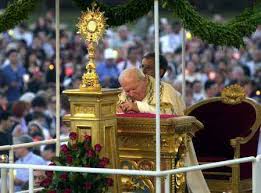Today, Friday 22 October 2021, the universal Church cries out with joy for the feast of Pope St John Paul II.
On this very day, forty three years ago, in the fully packed St Peter Square, the voice of this great holy Polish Pope echoed around the four corners of the world with these life-giving words: Brothers and sisters, do not be afraid to welcome Christ and accept his power. Help the Pope and all those who wish to serve Christ and with Christ’s power to serve the human person and the whole of mankind. Do not be afraid. Open wide the doors for Christ. To his saving power open the boundaries of States, economic and political systems, the vast fields of culture, civilization and development. Do not be afraid. Christ knows “what is in man”. He alone knows it (no.5).
St John Paul II taught us that only Jesus is the source of happiness which last. To the young people whom he loved so much Pope Karol Józef Wojtyła addressed the following words during the vigil of prayer in the 15th World Youth Day at Tor Vergata, on Saturday, 19 August 2000:
It is Jesus in fact that you seek when you dream of happiness; he is waiting for you when nothing else you find satisfies you; he is the beauty to which you are so attracted; it is he who provokes you with that thirst for fullness that will not let you settle for compromise; it is he who urges you to shed the masks of a false life; it is he who reads in your hearts your most genuine choices, the choices that others try to stifle. It is Jesus who stirs in you the desire to do something great with your lives, the will to follow an ideal, the refusal to allow yourselves to be grounded down by mediocrity, the courage to commit yourselves humbly and patiently to improving yourselves and society, making the world more human and more fraternal (no.5).
The more one gets to know Jesus the more one feels the natural need to make him known to others, connected of course with the universal Church. That is why, as one Church, we are called to share Christ with everyone! In his encyclical on the permanent validity of the Church’s missionary mandate, Redemptoris Missio, St Pope John Paul II says:
Faith is strengthened when it is given to others! It is in commitment to the Church’s universal mission that the new evangelization of Christian peoples will find inspiration and support. But what moves me even more strongly to proclaim the urgency of missionary evangelization is the fact that it is the primary service which the Church can render to every individual and to all humanity in the modern world, a world which has experienced marvelous achievements but which seems to have lost its sense of ultimate realities and of existence itself. “Christ the Redeemer,” I wrote in my first encyclical, “fully reveals man to himself…. The person who wishes to understand himself thoroughly…must…draw near to Christ…. [The] Redemption that took place through the cross has definitively restored to man his dignity and given back meaning to his life in the world” (no.2).
The presence of Christ amongst us, and in each and every one of us, demands that we sincerely forgive one another. In his Angelus address on the day Day of Pardon, Sunday 12 March 2000, Pope John Paul II said: As we ask forgiveness, let us also forgive. This is what we say every day when we recite the prayer Jesus taught us: “Our Father … forgive us our trespasses as we forgive those who trespass against us” (Mt 6:12). For all believers may the fruit of this Jubilee Day be forgiveness reciprocally given and received! Reconciliation springs from forgiveness. This is our hope for every Ecclesial Community, for all believers in Christ and for the whole world. Forgiven and ready to forgive, Christians enter the third millennium as more credible witnesses to hope. After centuries marked by violence and destruction, especially the last tragic one, the Church offers humanity, as it crosses the threshold of the third millennium, the Gospel of forgiveness and reconciliation, a prerequisite for building genuine peace (nos, 2-3).
A reconciled and forgiven Church, who is able, by God’s grace, to also forgive, can better dedicate herself to the promotion of the unique dignity of the human person both by denouncing the evil of injustice as well as by proclaiming the life-giving message of the Gospel. In his address to the members of the special committee of the United Nations Organization against Apartheid, of Saturday, 7 July 1984, St John Paul said:
The Holy See is not unaware of the numerous political implications surrounding these issues, but its interest is on another level: the level of the human person. And it is at this level that these matters cause deep disquiet, for the weight of suffering affecting the individuals and communities concerned is very heavy. The Catholic Church, faithful to her mission in the world, shares these sufferings and cannot pass them over in silence, for if she did, her witness of love and service to man would be compromised. The Good News which she received from her divine Founder obliges the Church to proclaim the message of salvation and human dignity and to condemn injustices and attacks on human dignity (no.3).
It is in this sense that the Church, being under the gaze of Christ, who is the light of the world and forged into the great mystery of redemption by the might work of God the Father, the Son and the faith, must be a pilgrim which is heading towards the Heavenly glory and fully fulfilled in the communion of saints.
In his angelus address on Monday, 1 November 1999, the Solemnity of All Saints, St John Paul II said:
Today we are celebrating the Solemnity of All Saints. On this festive occasion the pilgrim Church on earth lifts her gaze to heaven, to the immense throng of men and women to whom God has given a share in his holiness. As the Book of Revelation teaches, they come “from every nation, from all tribes and peoples and tongues” (Rv 7: 9). During their earthly life they were committed to always doing his will, to loving him with all their heart and their neighbour as themselves. For this reason they also suffered trials and persecutions, and now enjoy their great and eternal reward in heaven (cf. Mt 5: 11). Dear friends, this is our future! This is the most genuine and universal vocation of all humanity: to form the great family of God’s children by striving to anticipate its essential traits here on earth. We are drawn to this goal by the shining example of our many brothers and sisters whom, down the centuries, the Church has recognized as blesseds and saints, offering them as examples and guides to everyone. Today we call upon their common intercession, that every person will open himself to God’s love, the source of life and holiness.”
O Blessed Trinity, we thank you for having graced the Church with St John Paul II and for allowing the tenderness of your fatherly care, the glory of the Cross of Christ and the splendor of the Spirit of love to shine through him. Trusting fully in your infinite mercy and in the maternal intercession of Mary, he has given us a living image of Jesus the Good Shepherd. He has shown us that holiness is the necessary measure of ordinary Christian life and is the way of achieving eternal communion with you. Grant us, by his intercession, and according to your will, the graces we implore, through Christ our Lord. Amen.
St John Paul II, you who are one of this so great a cloud of witnesses (Heb 12:1), pray with us and for us! Amen.











